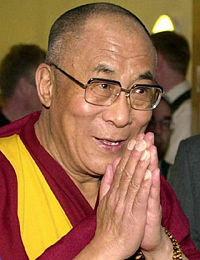Tenzin Gyatso, 14th Dalai Lama quotes
His Holiness, Tenzin Gyatso, 14th Dalai Lama (born 6 July 1935- ) Head of state and spiritual leader of the people of Tibet; Awarded the 1989 Nobel Peace Prize; born Lhamo Dhondrub, renamed Jetsun Jamphel Ngawang Lobsang Yeshe Tenzin Gyatso (Holy Lord, Gentle Glory, Compassionate, Defender of the Faith, Ocean of Wisdom) upon being officially recognized as the Dalai Lama. Tibetans often refer to him as Yeshe Norbu, the "Wishfulfilling Gem" or just Kundun; "The Presence."
Quotes
- My religion is very simple. My religion is kindness.
- It is very important to generate a good attitude, a good heart, as much as possible.
- Religion does not mean just precepts, a temple, monastery, or other external signs, for these as well as hearing and thinking are subsidiary factors in taming the mind. When the mind becomes the practices, one is a practitioner of religion, and when the mind does not become the practices one is not.
- It is the enemy who can truly teach us to practice the virtues of compassion and tolerance.
- I am a simple Buddhist monk; no more, no less.
- I believe that in the 20th century, humanity has learned from many, many experiences. Some positive, and many negative. What misery, what destruction! The greatest number of human beings were killed in the two world wars of this century. But human nature is such that when we face a tremendous critical situation, the human mind can wake up and find some other alternative. That is a human capacity.
- Reason well from the beginning and then there will never be any need to look back with confusion and doubt.
- Human happiness and human satisfaction must ultimately come from within oneself. It is wrong to expect some final satisfaction to come from money or from a computer.
- If you want others to be happy, practice compassion. If you want to be happy, practice compassion.
- Within the body there are billions of different particles. Similarly, there are many different thoughts and a variety of states of mind. It is wise to take a close look into the world of your mind and to make the distinction between beneficial and harmful states of mind. Once you can recognize the value of good states of mind, you can increase or foster them.
- Compassion without attachment is possible. Therefore, we need to clarify the distinctions between compassion and attachment. True compassion is not just an emotional response but a firm commitment founded on reason. Therefore, a truly compassionate attitude towards others does not change even if they behave negatively. Genuine compassion is based not on our own projections and expectations, but rather on the needs of the other...
- Compassion and tolerance are not a sign of weakness, but a sign of strength.
- All major religious traditions carry basically the same message, that is love, compassion and forgiveness ... the important thing is they should be part of our daily lives.
Answering the question "Your Holiness, there are many people in the West who want to combine their spiritual practice with social and political responsibility. Do you feel that these two aspects are connected?" in an interview with Catherine Ingram, Dharamsala, India (2 November 1988).
- I feel that the essence of spiritual practice is your attitude toward others. When you have a pure, sincere motivation, then you have right attitude toward others based on kindness, compassion, love and respect. Practice brings the clear realisation of the oneness of all human beings and the importance of others benefiting by your actions.
References
- Kindness, Clarity, and Insight (1984)
- Deity Yoga (1987)
- The Dalai Lama at Harvard: Lectures on the Buddhist Path to Peace (1988) by Jeffrey Hopkins
- Ocean of Wisdom: Guidelines for Living (1989)
- Freedom in Exile: The Autobiography of the Dalai Lama (1991)
- The Path to Enlightenment (1994)
- The Dalai Lama's Book of Wisdom (2000)
